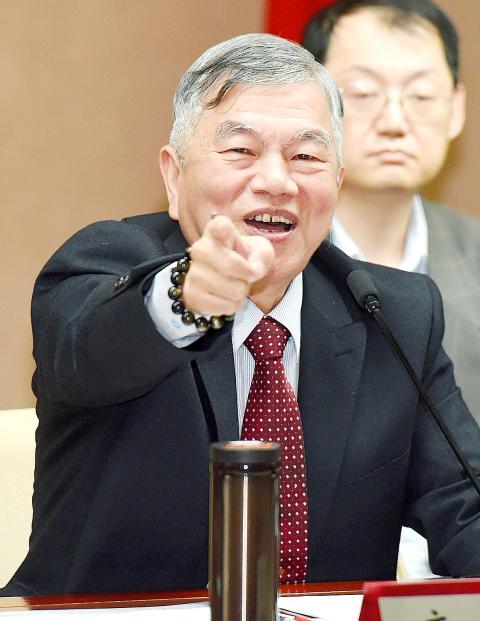The Ministry of Economic Affairs yesterday published a revised national energy strategy that calls for the abolition of nuclear power by 2025 and reductions in the use of fossil fuels.
Although Taiwanese in November last year voted against the government’s 2025 deadline to abolish nuclear power, the energy source would still be completely removed from the nation’s energy mix after that year due to inevitable constraints, Minister of Economic Affairs Shen Jong-chin (沈榮津) told a news conference in Taipei.
Resistance from local governments, difficulty in procuring replacement parts for aging reactors, finding storage space for spent fuel rods and the inability to complete the stay-of-decommissioning application process have all but ruled out the use of nuclear power beyond 2025, Shen said.

Photo: Huang Yao-cheng, Taipei Times
Other remedies, such as reactivating decommissioned nuclear plants, are also unlikely due to the lengthy budget approval process at the legislature, Shen said, adding that General Electric Co is no longer able to provide technical support for reactors that were installed decades ago.
As for referendum No. 7, which called for the reduction of thermal power by at least 1 percent per year on average, Shen said that the goal is achievable this year and next year.
Achieving the goal would not increase the risk of energy shortages and 15 percent reserved power generation capacity could be maintained, he said.
However, energy shortages could happen in 2021 due to an anticipated rise in consumption, Shen said.
Major expansions by Taiwan Semiconductor Manufacturing Co (台積電), Powerchip Technology Corp (力晶科技) and Winbond Electronics Corp (華邦電), as well as the continued adoption of electric vehicles and the return of Taiwanese manufacturing companies, would raise consumption by an additional 2 billion kilowatt-hours, he said.
“In light of rising demand, it is becoming increasingly difficult to cut the use of fossil fuels at a pace of 1 percent a year based on 2017 levels,” Shen said.
He urged the public to support the government’s drive toward renewable energy sources.
However, the government would fulfill the referendum’s requirement barring capacity expansions at coal-fired power plants and abide by local governments’ tightened environmental regulations and limits on coal use, Deputy Minister of Economic Affairs Tseng Wen-sheng (曾文生) said.
Fossil-fuel power generation uses coal and natural gas, Tseng said, adding that the government would continue to lower dependence on dirtier coal plants in favor of cleaner-burning gas plants.
Coal-fired power would trend down, but it would take more time to determine its proportion in the nation’s energy mix, Tseng added.

The US government has signed defense cooperation agreements with Japan and the Philippines to boost the deterrence capabilities of countries in the first island chain, a report by the National Security Bureau (NSB) showed. The main countries on the first island chain include the two nations and Taiwan. The bureau is to present the report at a meeting of the legislature’s Foreign Affairs and National Defense Committee tomorrow. The US military has deployed Typhon missile systems to Japan’s Yamaguchi Prefecture and Zambales province in the Philippines during their joint military exercises. It has also installed NMESIS anti-ship systems in Japan’s Okinawa

‘WIN-WIN’: The Philippines, and central and eastern European countries are important potential drone cooperation partners, Minister of Foreign Affairs Lin Chia-lung said Minister of Foreign Affairs Lin Chia-lung (林佳龍) in an interview published yesterday confirmed that there are joint ventures between Taiwan and Poland in the drone industry. Lin made the remark in an exclusive interview with the Chinese-language Liberty Times (the Taipei Times’ sister paper). The government-backed Taiwan Excellence Drone International Business Opportunities Alliance and the Polish Chamber of Unmanned Systems on Wednesday last week signed a memorandum of understanding in Poland to develop a “non-China” supply chain for drones and work together on key technologies. Asked if Taiwan prioritized Poland among central and eastern European countries in drone collaboration, Lin

Renewed border fighting between Thailand and Cambodia showed no signs of abating yesterday, leaving hundreds of thousands of displaced people in both countries living in strained conditions as more flooded into temporary shelters. Reporters on the Thai side of the border heard sounds of outgoing, indirect fire yesterday. About 400,000 people have been evacuated from affected areas in Thailand and about 700 schools closed while fighting was ongoing in four border provinces, said Thai Rear Admiral Surasant Kongsiri, a spokesman for the military. Cambodia evacuated more than 127,000 villagers and closed hundreds of schools, the Thai Ministry of Defense said. Thailand’s military announced that

CABINET APPROVAL: People seeking assisted reproduction must be assessed to determine whether they would be adequate parents, the planned changes say Proposed amendments to the Assisted Reproduction Act (人工生殖法) advanced yesterday by the Executive Yuan would grant married lesbian couples and single women access to legal assisted reproductive services. The proposed revisions are “based on the fundamental principle of respecting women’s reproductive autonomy,” Cabinet spokesperson Michelle Lee (李慧芝) quoted Vice Premier Cheng Li-chiun (鄭麗君), who presided over a Cabinet meeting earlier yesterday, as saying at the briefing. The draft amendment would be submitted to the legislature for review. The Ministry of Health and Welfare, which proposed the amendments, said that experts on children’s rights, gender equality, law and medicine attended cross-disciplinary meetings, adding that